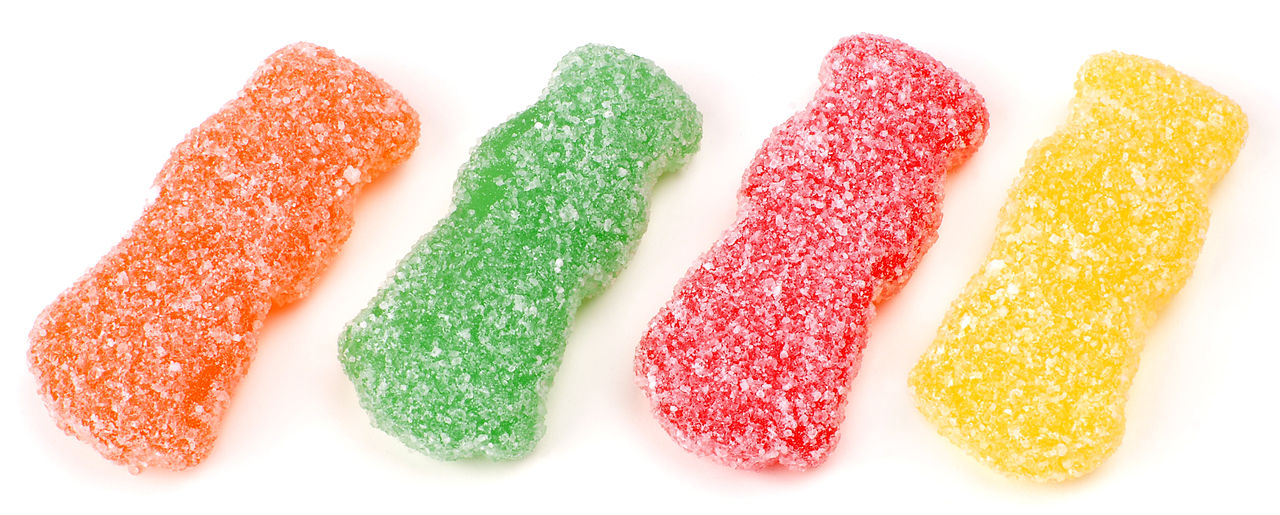

It’s hard to imagine any kid made it out of the 90s without at least one formative tongue-burning experience due to the overconsumption of sour candies. Whether it occurred at a movie theater or during a childish competition over who could hold the sourest candy in ones mouth for the longest time, it happened. For some of us (myself included) the sour candy addiction continued into adulthood. While Generation Y’s pain felt over a burnt tongue has most likely subsided into distant memory, for those who continue to consume sour candies, one question persists: why do these delicious candies sometimes burn my tongue? And more importantly, is it possible to permanently damage my taste buds?
Three main ingredients make up the variety of candies we call sour: sugar, acid, and food coloring. We all know there is a despicable amount of sugar in the extremely sour candies we crave, but the citric and malic acid found in almost equal amounts goes undiscussed. In 2008, a few pediatric dentists decided to look into the erosion of tooth enamel and tested the pH levels of the most popular sour candies to see just how bad for your teeth these addictive snacks are. The study, published in the peer-reviewed Journal of the Minnesota Dental Association, Northwest Dentistry, was appropriately titled, “Pucker Up–The Effects of Sour Candy on Your Patient’s Oral Health.” Their findings will make your teeth hurt.
pH, a measure of acidity, has to do with the number of protons present. Water has a pH level of 7.0 while battery acid comes in at a low 1.0. Most sour candies have pH levels much closer to battery acid than water, and acidity can damage teeth. Bacterial tooth decay occurs when bacteria, which thrive on the sugar in candy, create acid that attacks the tooth. Sour candies contain both sugar and acid, and tend to stick to teeth, making them a triple threat. The aforementioned study found candy like X-treme Airheads (pH 3.0), Sour Punch Straws (pH 2.5), Sour Skittles (pH 2.2), Fun Dip Powder (pH 1.8), and Warheads Sour Spray (pH 1.6) were shockingly acidic.
To add another piece to the pH puzzle, vinegar has a pH of around 4.5 and Coca-Cola comes in at a 2.5-3.0. We all know Coca-Cola isn’t sour, so what gives?
“Sour is your taste perception of acid,” says Dr. Tom Finger at the Rocky Mountain Taste and Smell Center at the University of Colorado, adding that “perception is not just purely pH.” In other words, acidic content doesn’t equal sour taste. Why? One reason is sugar. The presence of sweet suppresses the sour, and your perception is altered. Still, a pH level of 2.5 is a lot of acid, and the amount of time the acid spends in your mouth does matter. The longer you hold the candies in your mouth, or the more you eat, the more your tongue will hurt. This is because the acid from the candy lowers the pH level of your mouth, and if it stays low for a prolonged amount of time it acidifies the epithelium, the layer of cells covering your mouth and tongue. Your epithelium doesn’t get as irritated when you drink Coca-Cola, because the beverage passes through your mouth quickly, whereas chewing so many delicious candies exposes the tongue to low pH levels for a long time.
When you consume a large amount of sour candy in one sitting, the epithelium becomes irritated to such an extent that the pH-sensitive nerve fibers activate. These nerve fibers are what signal pain to the brain. Two sorts of pH-sensitive detectors exist: ion channels, which react to strong acidity, and transient receptor potential channels, which react to chile heat. Both activate the same pain receptors, and so does food that’s too hot.
Time will heal the pain of sour candy. The saliva will eventually stabilize the pH level in the mouth, but if you want to speed up the process, drinking water or dairy (both higher-pH beverages) will help, too. Dr. Finger says it is highly unlikely a person would burn off actual taste buds, but in case you’re worried, they completely regenerate every 10 days to two weeks, meaning permanently damaging your precious taste buds is not possible.
So why do we continue to eat too many sour candies if we know the experience has potential to end in lingering pain? The pleasure of eating and tasting the candy, of course. Dr. Finger compared eating too many sour candies and burning the mouth to going out to a bar and drinking so much that the next morning brings a dreadful hangover. By overlooking the long-term ramifications, it seems we are able to continue to enjoy the short-term gratification of both sour candy and alcohol.
